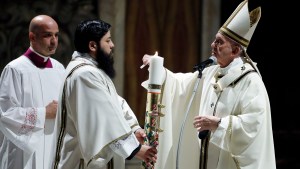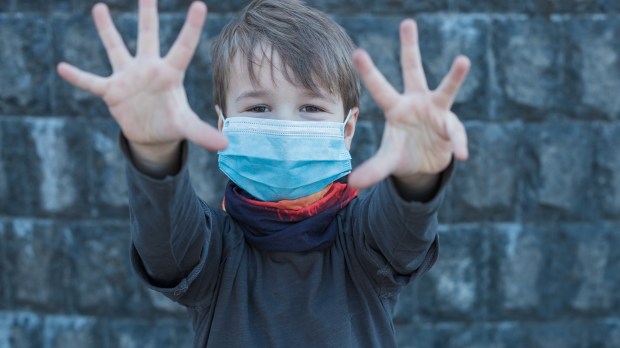Everything will be all right.
That was true on the day of the crucifixion, and it is true today — from the COVID-19 floors of hospitals to the unemployment lines.
Everyone somehow knows that everything will be all right.
“Everything will be all right” — “andrà tutto bene” — is what Italians from their balconies proclaimed at night early on in the COVID-19 crisis.
It is what New Yorkers scrawled on a rock on the banks of the East River near the Brooklyn Bridge.
An 86-year-old grandmother of 19 at St. Joseph’s Senior Home in Woodbridge, New Jersey, said it and lived. Many others remember it as the last words of the ones they have lost.
They lit the Rio de Janeiro Christ the Redeemer with that message. Signs appearing from Atlanta, Georgia, to Chicago proclaim it.
It was the message Sarah Willie, a St. Louis nurse living in a donated RV because half her staff has tested positive for COVID-19, had to say to the world: “Everything will be OK, everything will be OK.”
You hear it all over the world: “Ça va bien aller,” “Todo va a estar bien,” “alles wird gut” — and Father Sergio Argüello Vences says, it is what Our Lady tells us over and over again as we pray the Rosary.
“Everything will be all right.”
Wherever you find tragedy — even unfixable tragedy — you find one person saying to another, “Don’t worry. It will be all right.”
I have been thinking about this ever since Time magazine told the story of Cheley Stewart, a survivor of the terrible 2013 tornado in Oklahoma.
Her house had been torn in two and she had to stay in a shelter while she found a place to stay. “It’s like a war zone in there,” Stewart said, and then comforted her 6-year-old: “It’s crazy, I know. But everything will be all right.”
For human beings, hope is an absolute necessity. We can’t tolerate a world without hope. We say “everything will be all right” even when it does not appear to be even remotely true.
But it always feels true. Somehow, the comfort the mom offers her child is not empty wishful thinking. Somehow, “Everything will be all right” sounds comforting, even when they were someone’s last words.
Maybe especially when they are someone’s last words.
Pope Francis explained why.
In his Urbi et Orbi address, Pope Francis kept repeating Christ’s words to the apostles on the ship in the storm. “Why are you afraid? Have you no faith?”
He said that it is precisely in the storm that we most need to cling to Jesus. “The storm exposes our vulnerability and uncovers those false and superfluous certainties around which we have constructed our daily schedules, our projects, our habits and priorities,” he said.
Suddenly, we know everything will be all right not because we have the ability to make anything right, but because we lack the ability to get into trouble too big for Jesus Christ to solve.
“Everything will be all right” is almost a proof for the existence of God.
If there is no God, then the universe wasn’t designed by love; it emerged from chaos. Not only is there no reason to suppose things will be all right, an intelligent person should expect them to get worse.
But if there is a God, I can say, “Don’t worry. It will be all right,” in the middle of a pandemic, or a battle, or a storm, or as the last thing I ever say, into a ventilator.
God is in charge. His way will win in the end. He is there for us above and beyond even death.
“Fear not, for I am with you, be not dismayed, for I am your God,” he says. “I will strengthen you, I will help you, I will uphold you with my victorious right hand.”
Be not afraid. Everything will be all right.

Read more:
Full text of Pope Francis’ homily of Holy Saturday: On our right to hope

